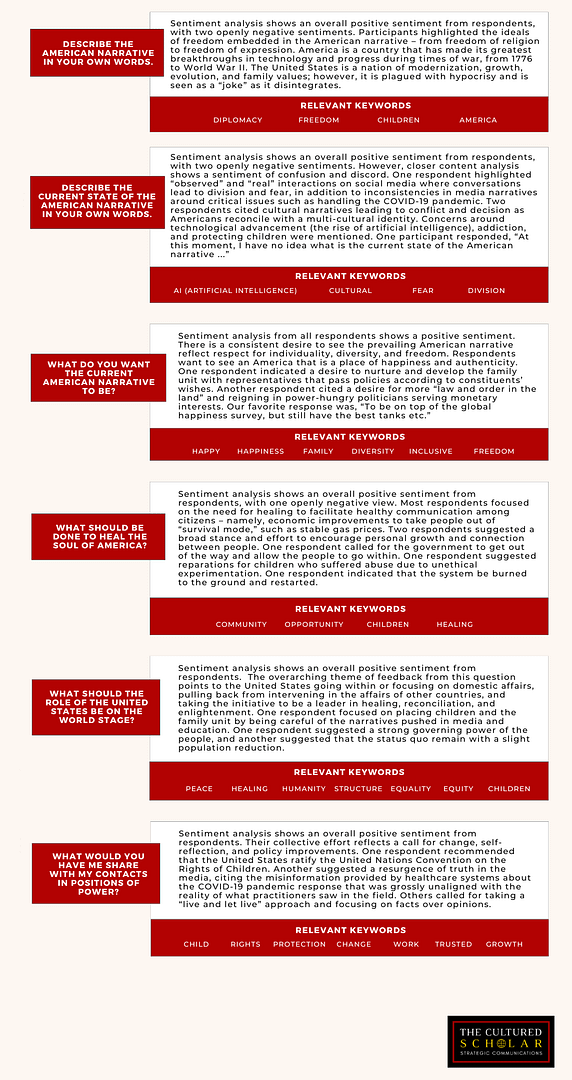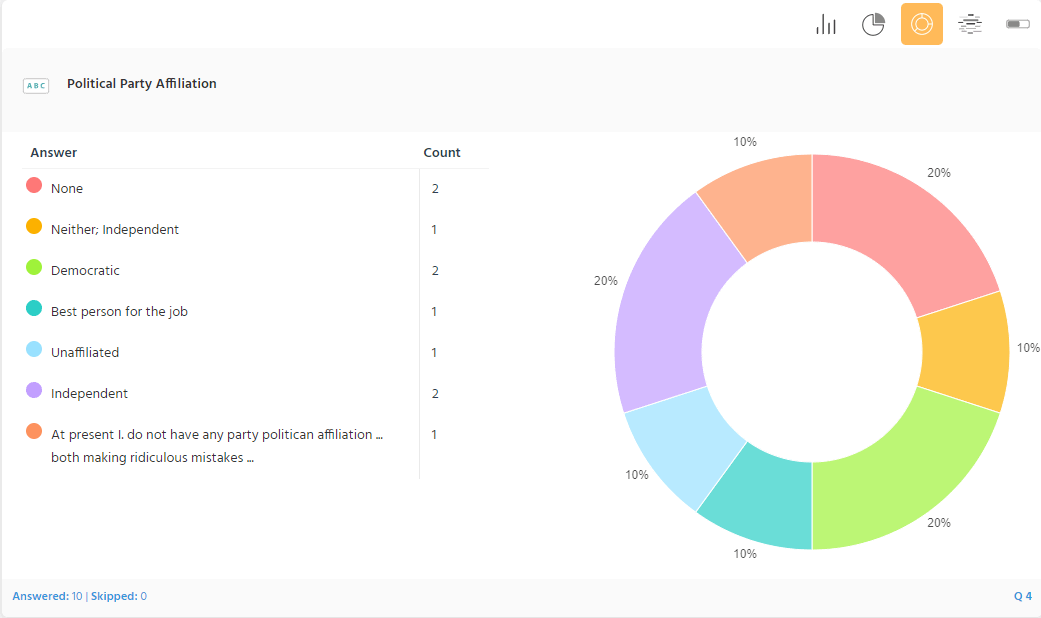Good leadership directly impacts your ability to succeed in your role, whether you are an influencer, a thought leader, a corporate executive, or a leader in the government, academic, or non-profit sector. One common complaint from employees, volunteers, and citizens is that leaders don’t listen to the people they lead or govern. There’s too much emphasis on quantitative data without qualitative context and an understanding of the attitudes and frustrations of the people.
The Cultured Scholar Strategic Communications takes these complaints seriously, as we have lived as marginalized people and essential workers who have been overlooked and forgotten. We set the goal to never where we came from. Aware of the skewed nature of multiple-choice surveys where participants choose answers they think may be the right one or select an option close to the truth but only partially accurate, we are pioneering open-ended surveys that offer authentic feedback and content-driven analysis.
The American Narrative Survey
The American Narrative Survey is our ongoing survey where participants have the opportunity not only to discuss and share thoughts about America’s position in the world but also to have a clear forum to directly offer concerns and insights that will be shared with decision-makers, researchers, and the public. Due to limited reach, there were only a few responses between June 2022 and June 2023 – 15 attempted respondents with seven completed submissions. The number of responses is statistically insignificant compared to the U.S. population. Still, the quality of the reactions offers interesting insights into America’s current narrative positioning and what to look for going forward.
Results:
The survey contained the following six open-ended questions and general responses:

“The Constitution, our laws, and beliefs are living entities and should be allowed to evolve and grow along with our society. Repealing laws and taking away people’s rights to choose is going backward and stifling said growth.” – Anonymous Respondent
Analysis and Discussion
The survey results illustrate frustration with the current state of the American narrative – the story of the character and nature of the United States domestically and globally. However, the consensus reflects hope for change and correction in U.S. domestic and foreign policy that can heal the soul of America and restore the romantic narrative humanity has come to know. Respondents generally reminisced on the classical American narrative based on a desire for freedom of religion, expression, and individual pursuit of happiness – popular sovereignty. These rights have always been and still are worth fighting and dying for. Due to current conditions, a few respondents were hard-pressed to find anything to be proud of in the American story.
In the current state of America’s story, there was agreement that the country is experiencing a period of confusion, discord, distrust, and disunity, citing the COVID-19 pandemic and the diversity, equity, and inclusion debate as examples. Pew Research published a report in June 2022 that found 52% of Republicans and 56% of Democrats collectively agreed that the U.S. government isn’t doing enough to address issues that acutely affect middle and low-income classes. The COVID-19 pandemic disproportionately impacted middle and low-income families in the United States, yielding increased mortality rates and traumatic outcomes influenced by social and economic turmoil, including job losses and increased domestic burdens.
Interestingly, the respondents to our survey identified as either Democrats or a variation of non-partisan/unaffiliated:

Extracted keywords and key phrases from respondents still indicated liberal and conservative beliefs despite a lack of indicated partisanship. For example, respondents focusing on the “family unit,” “children’s rights,” and “law and order” are more likely to lean toward conservatism. Respondents focusing on “diversity, equity, and inclusion;” and “disarming the police” are more likely to lean toward Democratic or neo-liberal values.
Political party lines in America may appear to be blurred, but the reality is that the public is desperately seeking sensible leadership. In 2021, a Gallup poll found that 62% of poll participants desired a third political party, with 63% to 70% of Republicans seeking a third party in the wake of Former President Donald Trump’s MAGA movement and the infighting within the GOP. In 2022, the desire for a third party dipped slightly to 56%. One of the respondents to our survey shared, “At present, I do not have any party political affiliation … both making ridiculous mistakes …” This respondent went on to specifically critique the Republican party, express disdain for Trump, and called for more “law and order in the land.”
According to data from Gallup Analytics, a 2023 survey with a sample size of 1,011 participants found that 48% of respondents were very dissatisfied with things in the U.S., 28% were somewhat dissatisfied, 18% were somewhat satisfied, and 6% were very satisfied.

The American narrative depends on the state of things in the United States, whether we consider quality of life, healthcare outcomes, interpersonal relationships in society, the economy, and many other factors. The factors that matter most are the policies pushed and implemented by leadership in the public and private sectors. According to respondents to our survey, the best way to heal the soul of America is to return to our core values of liberty, order, justice, and limited government. To focus social agendas on healing, equity, and cooperation. To run active, norm-based campaigns and narratives focusing on self-reflection at all levels of society and becoming mature adults who are responsible stewards of the earth, family, and society. Respondents expressed that focusing on these values of reconciliation, freedom, equality, and equity will reposition the United States as a responsible global hegemon deserving of the respect it has held since the end of World War II.
Final Thoughts
We must remember that all polls and surveys reflect the attitudes of sample populations that pale in comparison to the total United States populous. While polling firms, academic institutions, and media outlets do their best to capture large sample sizes to be as accurate as possible about the pulse of the American body politic, we must remember that there are populations that don’t have access to the internet, quality education, or other resources that ensure they, too, have a voice in matters of society, economy, and governance. Additionally, our research shows there is value in hosting more focus groups and running open-ended surveys that allow authentic opinions and voices to be heard outside of pre-written petitions, emails, and scripts prepared by lobbying firms and advocacy groups. Leveraging social media intelligence, open-source intelligence, and digital communications analytics techniques can help us gain deeper insights into the mind of Americans and make better decisions in all sectors.
Leaders cannot effectively govern a people they refuse to be among, and it’s critical that leaders in all sectors, especially government, place just as much importance on qualitative studies and social listening as they do quantitative research and analysis.
We look forward to reporting the next phase of results as the 2024 election season approaches and a new world driven by artificial intelligence, web3, NFTs, and fintech comes to the fore!
Discover how our research and analysis can help you connect with the people, convert supporters to your side, and conquer vice in the name of virtue! Review our offerings and reach out today!
